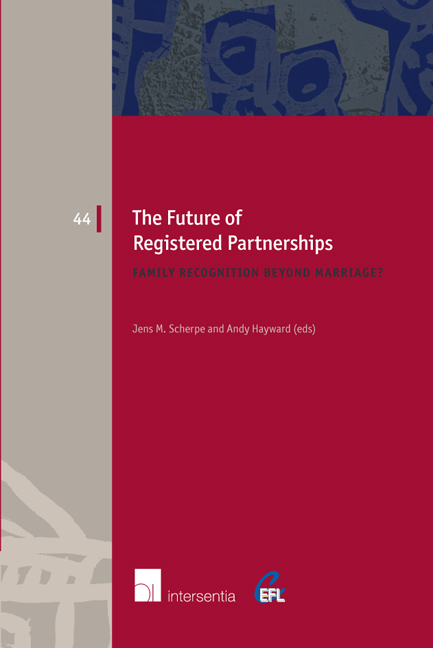Book contents
- Frontmatter
- Foreword
- Preface
- Contents
- List of Contributors
- The Future of Registered Partnerships: An Introduction
- Questionnaire
- Part I Registered Partnerships as a Functional Equivalent to Marriage
- Part II Registered Partnerships as an Alternative to Marriage
- Part III Registered Partnerships in a Time of Transition
- Part IV Alternative Models for Registered Partnerships: Beyond Conjugality, Beyond Formality
- Part V Registered Partnerships, Discrimination and Human Rights
- Part VI Comparative Perspective and Conclusions
- Index
- European Family Law Series
The Future of Registered Partnerships: An Introduction
Published online by Cambridge University Press: 22 September 2018
- Frontmatter
- Foreword
- Preface
- Contents
- List of Contributors
- The Future of Registered Partnerships: An Introduction
- Questionnaire
- Part I Registered Partnerships as a Functional Equivalent to Marriage
- Part II Registered Partnerships as an Alternative to Marriage
- Part III Registered Partnerships in a Time of Transition
- Part IV Alternative Models for Registered Partnerships: Beyond Conjugality, Beyond Formality
- Part V Registered Partnerships, Discrimination and Human Rights
- Part VI Comparative Perspective and Conclusions
- Index
- European Family Law Series
Summary
For a long time, family law was the law of marriage. As a result, ‘family’ was only created and legally recognised by the act of marriage. In 1866, Lord Penzance in the English case of Hyde v. Hyde and Woodmansee defined marriage as follows:
I conceive that marriage, as understood in Christendom, may for this purpose be defined as the voluntary union for life of one man and one woman, to the exclusion of all others.
This, and similar definitions used in other jurisdictions, dominated the legal and societal perception of marriage – and, in turn, the very meaning of family. For much of the twentieth century the recognition of same-sex relationships as ‘family’ was out of the question, as was the recognition of non-marital relationships. Indeed, procreation outside of marriage was (at best) strongly disapproved of, and children born out of wedlock (and their parents) suffered many disadvantages. This position endured until 1979 when the European Court of Human Rights held in Marckx v. Belgium that this discrimination had to end – even though it took quite some time before the reforms in this area of law were carried out by all Contracting States. Developments around this time such as the liberalisation of divorce law, the removal of the legal consequences of illegitimacy and changing social attitudes gradually led to greater acceptance of non-marital relationships and, albeit somewhat later, same-sex relationships.
The dominance of marriage as the only acceptable family form increasingly was challenged, and, in many ways, considered out of touch with the lived realities of many couples, both opposite- and same sex. In particular, the approach of restricting legal rights to those relationships that were formalised through marriage and denying them to those that functioned in an identical manner was seen as retrograde and potentially discriminatory. After all, and as noted by Ward LJ in the English Court of Appeal decision of Fitzpatrick v. Sterling Housing Association Ltd :
The question is more what a family does than what a family is. A family unit is a social organisation which functions through its linking of members closely together. The functions may be procreative, sexual, sociable, economic, emotional.
In addition, whether a couple chose to express their relationship through marriage was not merely symbolic or ideological: the formal expression of a relationship had and still has profound legal consequences.
- Type
- Chapter
- Information
- The Future of Registered PartnershipsFamily Recognition Beyond Marriage?, pp. 1 - 10Publisher: IntersentiaPrint publication year: 2017



